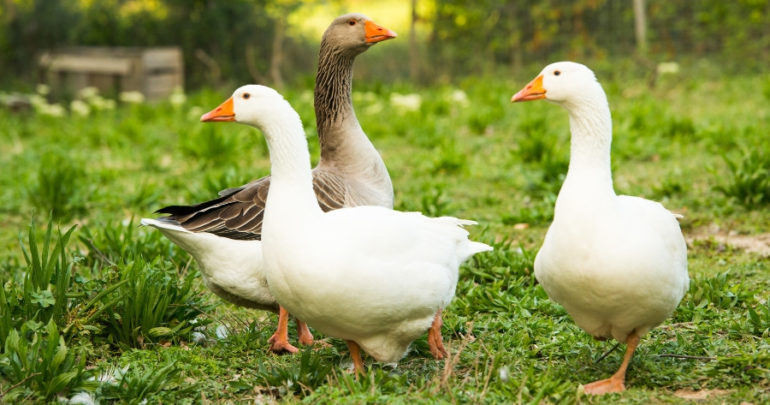WHY RAISE WATERFOWL?
Beyond their companionship, waterfowl are also valued for their utility. Ducks and geese are foragers and will eat leftover kitchen and garden scraps, providing nutrient-dense manure that can be used as fertilizer for next year's garden. Duck eggs are also valued by many as an alternative to chicken eggs. Geese can serve as watchdogs, trumpeting to the arrival of a stranger. They also have been known to remove pests such as rats, snakes or mice from a property.
BROODING
Because ducklings and goslings are normally larger and grow faster than chicks, they require more space per bird in the brooding area. The designated area should be clean and covered in absorbent bedding. Ducklings can be especially messy and require more routine clean-up. Allow easy access for food and water. Ducklings and goslings climbing into the water and becoming chilled or drowning can be a problem. Set up waters so that the young birds cannot climb/fall into them.
Provide ducklings and goslings with a heat source. Either a radiant propane brooder or an electric heat lamp can be used in the brooding area. Test the temperature before the ducklings or goslings arrive. Set temperature at 85-90 degrees F. Reduce the temperature by 5-10 degrees each week for 4 weeks. Track the behavior of the ducklings and goslings and their location of huddles. If they are too cold, they will huddle directly underneath the heat source. If they are too hot, they will attempt to scatter toward the edges, away from the heat source.
HOUSING
Like any other species of poultry, ducks and geese require an enclosed area free of predators and shelter against weather. Ducks and geese do not require ponds for swimming. However, they do need access to enough water to clean their bills to keep them from becoming clogged. Ducks and geese kept on open ponds run the risk of attack by predators or acquiring disease or parasites spread by wild birds. If the waterfowl are kept on an open pond, it is strongly suggested to provide shelter for the birds at night as well as an easily accessible food supply.
FEED
Start ducklings and goslings on a waterfowl starter. If waterfowl starter is not available, chick starters can be purchased at most feed stores. Starter feeds are very important for young birds because they contain medication that prevents coccidiosis (a potentially deadly poultry disease). Starter grain will consist of about 20% protein and 4-5% niacin. Protein and niacin are very important for ducklings and geese because of their rapid growth. Birds that do not receive starter rations early in development often have stunted growth and are not considered as desirable for exhibition.
KEEPING WATERFOWL HEALTHY
Waterfowl tend to be less susceptible to parasites. However, it is important to routinely check birds for mites, lice, and ticks. Ducks and geese require large waters in order to wash their beaks, eyes, and feathers. Much of the water ends up splashed throughout the coop as the birds clean themselves. It is very important to regularly clean the bedding to prevent mold from growing. Keep the feed away from a water source; moldy food can be toxic to ducks and geese.
REFERENCES
Raising Waterfowl - Philip J. Clauer and John L. Skinner
Raising Ducks - Melvin L. Hamre
Raising Geese - Melvin L. Hamre
Resources
Do you want to learn more about raising waterfowl? - If you are wanting to learn more about raising waterfowl, this booklet is for you!
Raising Ducks - Guide to raising ducks and flock management
Raising Ducks in Small Flocks - A University of California Cooperative Extension service document on small duck flocks
Raising Geese - Guide to raising geese and flock management
Raising Geese (University of California) - A leaflet on raising geese from the University of California Cooperative Extension service
Brooding and Rearing Ducklings and Goslings - Want to raise ducks or waterfowl? This is a great place to start your research.
Feeding Ducks - Guide to proper feeding and nutrition of ducks.
